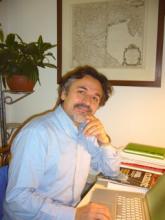- Home
- Department
- Research
- Teaching
- Post Graduate Studies
- Services and Equipment
- Knowledge Transfer
Signal transduction in basic and clinical oncology (Prof. Del Sal)
Research Strand:

Prof. Giannino Del Sal
Phone: 040 3756801
Fax: 040-398990
Biosketch
Education and training
1988-1989 Research fellow in Molecular Oncogenesis, Cell and Genome Studies Unit, International Centre for Genetics and Biotechnology (ICGEB), Trieste, Italy.
1987 Research fellow in Molecular Oncogenesis, Cell and Differentiation Program, European Molecular Biology Laboratory (EMBL), Heidelberg, Germany.
1985-1986 Research fellow in Biochemistry, Dipartimento di Biochimica, Università degli Studi di Trieste, Trieste, Italy.
23/11/1984 Laurea summa cum laude in Biology, Università degli Studi di Trieste, Trieste, Italy.
Positions and Employment
2012-2018 Director, Dipartimento di Scienze della Vita, Università degli Studi di Trieste, Trieste, Italy.
2001-present Full Professor in Applied Biology, Università degli Studi di Trieste, Trieste, Italy.
1996-present Head, Molecular Oncology Unit, LNCIB, Trieste, Italy.
1998-2001 Associate Professor in Applied Biology, Università degli Studi di Trieste, Trieste, Italy.
1991-1998 Assistant Professor in Applied Biology, Università degli Studi di Trieste, Trieste, Italy.
1994-1996 Visiting scientist, Laboratory of Cell Biology, Mitotix Inc., Cambridge, USA.
1992-1994 Researcher, LNCIB, Trieste, Italy.
1990-1991 Associate expert, Cell and Genome Studies Unit, International Centre for Genetics and Biotechnology (ICGEB), Trieste, Italy.
Editorial activity
2017-present Member, Editorial Board of Cell Death and Differentiation
2017-present Member, Editorial Board of Journal of Molecular Cell Biology (JMCB).
2008-present Member, Advisory Editorial Board, EMBO reports.
2008-2011 Member, Advisory Editorial Board, EMBO journal.
Other experience and professional membership
2018- present Member, Scientific Standing Committee for the Pezcoller Symposia-Fondazione Pezcoller
2014-present Member, Faculty, Joint PhD Program in Molecular Biology (JuMBO) of Scuola Internazionale Superiore di Studi Avanzati (SISSA), International Centre for Genetics and Biotechnology (ICGEB), Università degli Studi di Udine, Università degli Studi di Trieste.
2010-present Member, Fellowship Scientific Committee, Associazione Italiana per la Ricerca sul Cancro (AIRC).
2006-2015 Member, International Scientific Advisory Board, Istituto Toscano Tumori (ITT).
2011-2012 Member, GEV panel of expert evaluators for Areas 5 and 6 (Gruppi di Esperti della Valutazione per l’Area Scienze Biologiche e per l’Area Scienze Mediche), National Agency for the Evaluation of Universities and Research Institutes (ANVUR).
2010-2012 Member, Research Evaluation Committee (CVR), Università degli Studi di Trieste.
2007-2012 Director, PhD School in Molecular Biomedicine, Università degli Studi di Trieste.
2004-2009 Member, Scientific Committee, Associazione Italiana per la Ricerca sul Cancro (AIRC).
2004-2007 Member, Scientific Committee, Consorzio di Biomedicina Molecolare (CBM), Trieste, Italy.
Over 15 years
experience: Reviewer for national and international funding organizations, among which: European Commission, Israeli Science Foundation, Cancer Research (UK), Wellcome Trust (UK), Research Council of Hong Kong, World Wide Association for Cancer Research (UK), Fondation contre le Cancer (Be), EMBO (Germany), Associazione Italiana per la Ricerca sul Cancro (AIRC, Italy) and many others.
Over 15 years
experience: Reviewer for Nature, Nature Medicine, Nature Cell Biology, Molecular Cell, Science, EMBO Journal, EMBO Reports, Journal of Cell Biology, Proceedings of the National Academy of Sciences USA, Cancer Research, Oncogene, Cell Death and Differentiation, Journal of Cell Science and many others.
Honors and Awards
2006 Membership in recognition of his scientific achievements, European Molecular Biology Organization (EMBO).
Scientific Profile
Since the beginning of his scientific career, Del Sal has devoted himself to the study of cancer biology, integrating different aspects, approaches and technologies and providing seminal contributions to the elucidation of key mechanisms in the pathogenesis of tumours. His work integrates the study of the mechanisms of tumour suppression in health and cancer, the investigation of the role of different oncogenic pathways in cancer development and metastasis, as well as more translational research devoted to the development of novel strategies and tools for cancer therapy.
Among the most significant scientific discoveries:
- the first cloning and characterization in the context of growth arrest of GAS1, a Sonic Hedgehog binding protein (Del Sal et al., Cell 1992; Del Sal et al., Proc Natl Acad Sci USA 1994);
- the discovery of new post-translational modifications (Gostissa et al., EMBO J 1999) and new sub-cellular localization of the tumor suppressor p53 (Fogal et al., EMBO J 2000);
- the discovery of new regulatory mechanisms of wt p53 and p53 family proteins (Zacchi et al., Nature 2002; Mantovani et al., Mol Cell 2004; Mantovani et al., Nat Struct Mol Biol 2007; Drost et al., Nat Cell Biol 2010);
- the discovery of the proteasome machinery as a key target of a common gain-of-function program shared by diverse missense mutants of p53 in cancer (Walerych et al., Nat Cell Biol 2016).
- the discovery of the impact of the prolyl-isomerase Pin1 on Notch pathway in proliferation and maintenance of normal and cancer stem cells of the breast, as well as on the full activation of mutant p53 oncogenic functions and the identification and characterization of the first covalent Pin1 inhibitor selectively targeting cancer cells by a dual mechanism of action. (Rustighi et al., Nat Cell Biol 2009; Rustighi et al., EMBO Mol Med 2014; Girardini et al., Cancer Cell 2011; Campaner et al Nat Commun 2017);
- the discovery of the metabolic control of the Hippo pathway transducers YAP/TAZ by the mevalonate pathway (Sorrentino et al., Nat Cell Biol 2014), and the discovery that mevalonate and mechanical cues regulate the stability and function of mutant p53 (Ingallina et al Nat Cell Biol 2018). These results provided the evidence-based rational for the design and activation of two clinical phase II studies i) on the activity of pre-operative zoledronate in triple negative breast cancer (clinical trials.gov NCT02347163) and ii) a multicenter, randomized, phase II study of neoadjuvant chemotherapy associated or not with zoledronate and atorvastatin in triple negative breast cancers (clinical trials.gov NCT03358017).
- the discovery of the hormonal control by Glucocorticoids on the Yap activity in breast cancer (Sorrentino et al Nat Commun 2017).
Patents
- Patent US8822420 B2 - Peptides and aptamers therof as specific modulators of mutant p53 function.
- Patent WO2012172511 A1: Method for the prognosis of breast cancer based on the expression of the gene PIN1 in combination with mutations in the gene TP53.
Info
Last update: 04-16-2024 - 23:30



